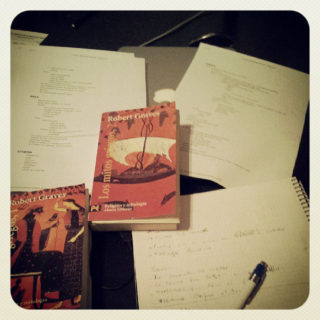Roque Rey is a member of Coffee Powered Machine, an Argentinian development studio. The indie developer created Okhlos, which won Best Game at the Awesome Games Awards in Córdoba, Argentina and will be shown off at Indie Prize Berlin 2017. The game was published by Devolver digital.
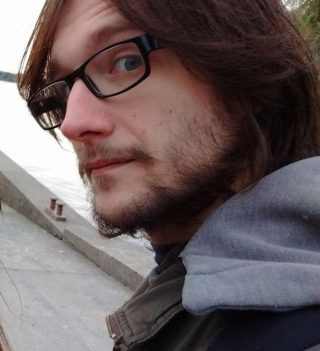
“On a personal level, its a huge achievement,” said Roque. “We were approached by a few publishers, and even then we wanted to remain independent and do self-publishing. Eventually, the Devolver option simply made sense and the pros outweighed the cons. Also, Devolver has a proven record, so for our first big game, it made sense to launch with them.”
“The Indie Prize was a complete surprise,” Roque added. “We weren’t expecting to win it. We weren’t even sure if we were gonna be able to attend the main event. Happily, we ended up deciding to make some time and go. I personally have never crossed the Atlantic ocean, so travel to Berlin to the Casual Connect will be a completely new experience.”
As far as representing Argentina, Roque sees that as an honor, noting the challenges indie developers have in the South American nation. “The thing is that Argentina has some amazing devs, but we all entered too late to the indie party. Publishing indie games in 2012 is not the same as to launching games in 2016,” they described. “So, right now most of the devs here are timidly trying to figure what to do, and how to gain exposure and recognition. The Argentinian video game dev industry is quite small, so we know each other, we talk among ourselves and we are all very supportive to each other.”
“I feel like we still need to gain some international awareness, but we are going in the right way. I hope we can do a good and fair job representing the Argentinian industry with Okhlos. Some things that we are really proud about Okhlos is that, for starters, Okhlos is a non-English word and in an industry so Anglo-centric as this is, having the name of the game in Greek is very important for us,” Roque said, joking that the name Coffee Powered Machine “might be a misstep from our early days” before continuing, “(The) other thing is that usually, in game industries from countries with a small game dev scene, the games tend to be mainly from that country folklore and customs. We did almost the opposite in Okhlos and we aimed at a subject that we were interested. It is cool to have games about gauchos and tango, but this is what we wanted to do, but it also resonates with our idiosyncrasy in some way, because of the convoluted Argentinian history and the amount of manifestations that we have.”
Ending Olympus
The setting of Okhlos is a unique take on the mythology of ancient Greece, built around a philosophical rejection of the Olympus pantheon, leading to an open revolt. Roque says that Coffee Powered Machine simply loves the setting and wanted to explore something based around history and mythology.
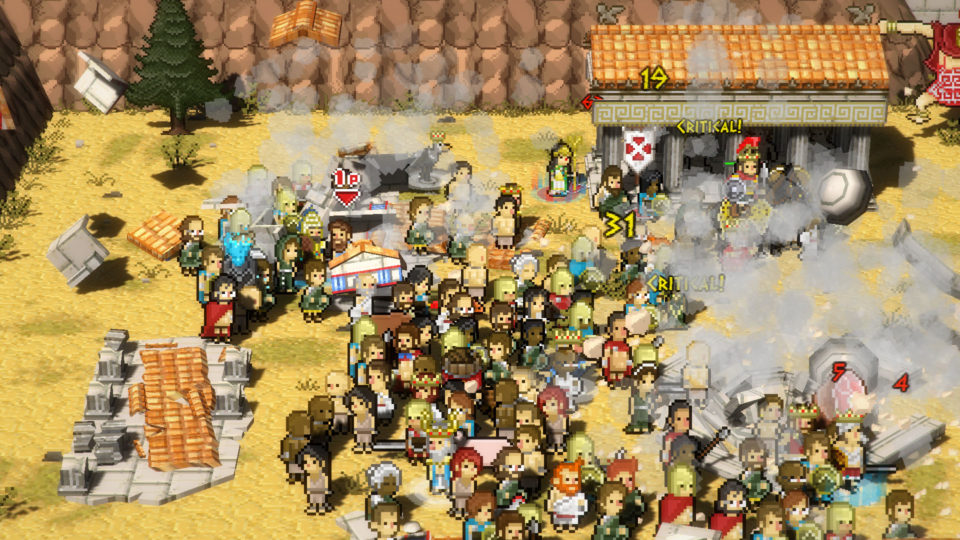
“Even if it is a very used setting, the chance of using it was very interesting,” Roque detailed. “When we started the project we had the idea of using a mob, and that translated into having tons of characters, and both Greek history and Greek mythology are very rich in that regard, so it felt like a smart choice going in that direction. Also, from a more historical perspective, in Greece you had the separation between the age of heroes to the age of cities, where the collective effort and a first concept of community (the polis) was born, so it really helps the idea that a rebellion against the gods can’t be pushed forward without a collective effort, and that resonated really well with the idea of the mob.”
“We started with the idea of the mob, but finding the rogue-like formula that fitted Okhlos took some time. At first, we started working on the mechanics, but we couldn’t find a way to effectively frame the mechanics we were working on. We did a lot of prototypes until we found the rogue-like formula,” they noted about trying to find the gameplay that worked. “We had a stealth type of game prototype, a beat-’em-up, lots of weird ideas to see how the main loop would be. Eventually, we found out that the rogue-like genre allowed us to test the game and finding cool stuff each time we played because of the emergence of the genre, so we could develop the mechanics further without boring ourselves each time we had to test the game.”
As evidenced in the eclectic style of Okhlos, Coffee Powered Machine has no focus on making games for any particular genre. “We have no idea what will be our next project for that reason, we really want to explore all the genres that we enjoy as players,” they detailed. “As for platforms, we prefer PC/consoles, because is the market where the games we play are. We don’t want to do mobile anymore, because we think that is a very nasty and hard market.”
Living Room Based Studio
Coffee Powered Machine is based out of Roque’s house, something that blurs the lines between work and home and workdays and weekends. Despite sharing a physical space, after a morning meeting the team typically works on their own laptop, communicating in chat not to interrupt each other.
“We didn’t have money to rent a place, but we thought that working in the same place physically would be more productive than working online,” said Roque. “Also, having to show up every day like an office job makes it easier to avoid distractions, and is a statement that we are taking our job seriously.”
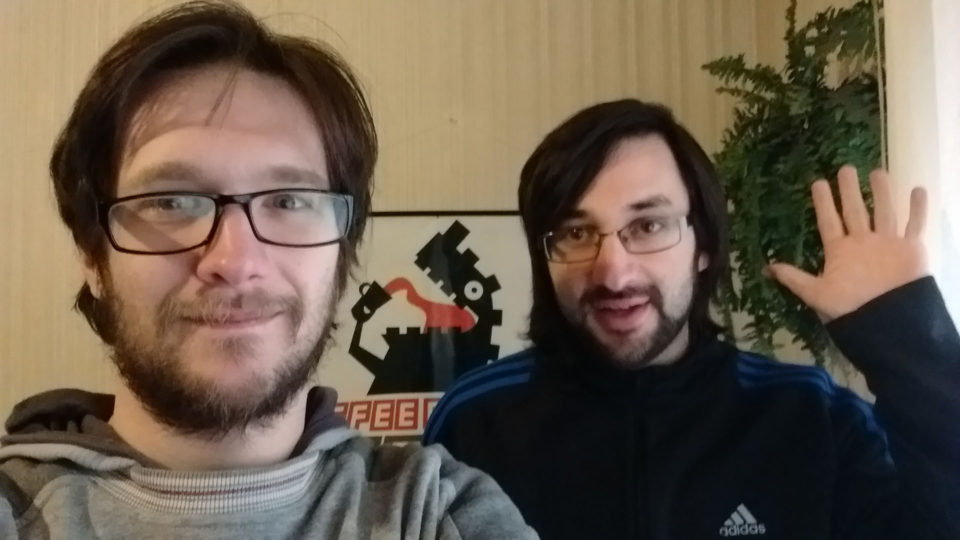
“We think we have a very quirky/silly sense of humor that is not used very often in games. We created the studio to have creative freedom and do whatever we wanted,” they added. “The games we make are for us, even though we can’t fully enjoy them because we are the ones that developed the games, but the creation of the studio and in consequence, the games we make, is to fulfill a creative desire more than anything else.”

Two Man Team
Roque indicates that Coffee Powered Machine is a highly democratic studio, with its members having to agree on major decisions. In case where they can’t agree, they can try out both ideas and playtest them to see which is better.

“We don’t have Scrum or anything like that. When we are planning things, we usually spent one or two days discussing and then we start implementing it,” describes Roque. “At any point in the implementation we start to figure out what works and what (does) not, and according to that we start making changes. Usually things change a lot from what we had planned. Other times, some decisions are pretty obvious and we can have it in the game integrated in a day or so, and the thing just works and its amazing. But these are clearly rare cases. We found out that we have to constantly revisit design choices. The good thing about this is that we try to implement our ideas very quickly, so we can find out how well they work.”
When it comes to development itself, the studio uses Unity. “Sebastián is a programmer, and I’m the graphics guy, but Unity makes (it so) I have a lot of control into what’s going on in the project. I can mess with shaders, and do weird stuff because of the accessibility of Unity. Also, sometimes I need something and I don’t have to bother Sebástian. I just download an asset that does what I want and we are done.”
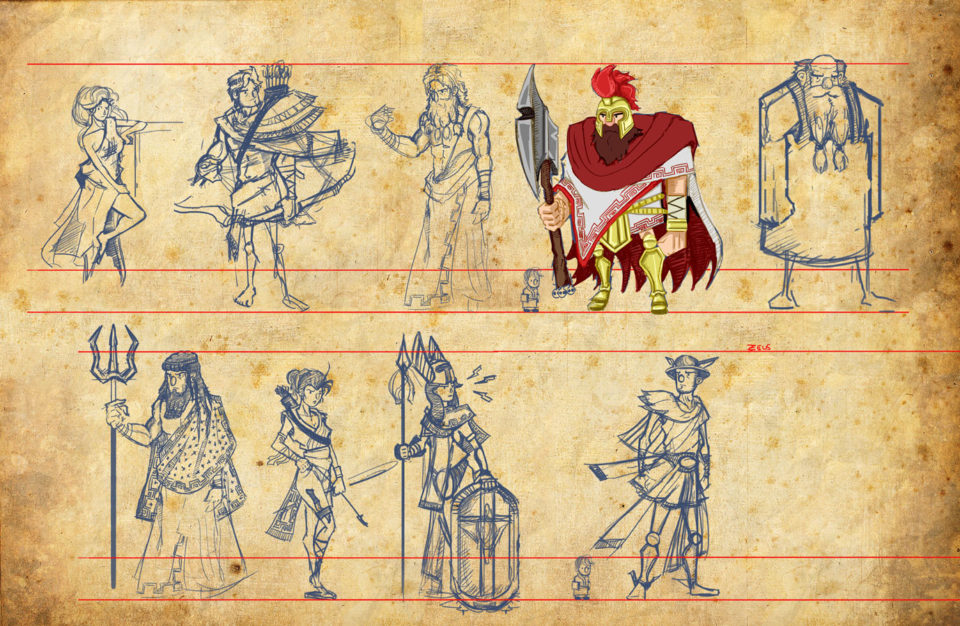
“Also, I only try to bother Sebastián with tools for me when I think that the time I will save is meaningful. I asked for a few photoshop scripts and a few Unity editor scripts – they were really time savers,” they said, adding. “We don’t want to reinvent the wheel, so if we find a Unity plugin or a tool that does the job that we want to do, we just use it.”
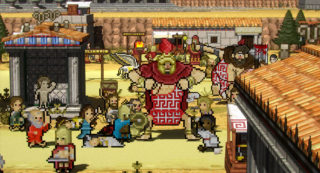
When asked to dream about doing a bigger project, Roque imagined it would be much like they were doing now, but just bigger and more interesting mechanics. “We are just two in the studio, so working with more programmers/designers for games that have a similar scope than Okhlos sounds amazing for us,” Roque said. “I hate doing HUDS and choosing fonts, or designing the web page. If I could hire someone to do those things for me, that would be amazing.”

As for monetization, Roque made it clear they are firmly on the side of payment up front, rather than trying to extract money with ads or micro-payments. “We really don’t like F2P, and on Steam most apps are paid, so it was always a very obvious choice for us to pursue that path,” they said. “With Okhlos, we always knew that we wanted the game to launch on Steam, and in this way, we also didn’t have to deal with monetization problems, and we could focus more on the game.”
Event Testing
Testing is an important part of any game being developed, but it can be hard for indie developers to secure, given their limited resources. Because of that, family members and friends end up getting roped into testing, and Roque related how they made conventions into test beds for Okhlos.
“We attended tons of events, and in every event we test how the people feel the game, and we take notes about that. A month before launching the game we did a playtesting and it was a fantastic experience. For Okhlos, a game that took four years to develop, I think the wisest would had been doing two or three playtesting sessions,” detailed Roque. “For the functional testing, we worked with a company that Devolver provided, but the experience was not amazing, so we are thinking that for future projects we will be doing our own testing in-house.”
“In the Okhlos playtesting sessions we had people that never used the second stick, and others that would constantly click the left mouse button instead of holding it,” they continued. “We tried a lot to design around this. If a user really wants to smash the left mouse button countless times, he should be able to do that, so we added a little input lag when the game receives multiple inputs in a short amount of time.”
While the testing has resulted in a generally acclaimed game, Roque still felt the sting from the minority of reviews which were negative. “We had tons of very positive reviews, and only a few negatives, but the negatives are always more present in your head. It is like you pay more attention to the negative ones than to the positive ones,” Roque said. “Doesn’t matter if the ratio is 10 to 1, the negatives stuck much more easily than the positive ones.”
The Monty Python of Video Games
While the Hellenistic inspiration for Okhlos is clear, Roque notes that other things helped form it. Surprisingly, most of those inspirations are not other video games, but were instead general popular culture.
“We were primarily inspired by literature, but we have a ton of pop culture references,” detailed Roque. “In Okhlos, we had a ton of Monty Python jokes and Terry Pratchet references. I actually don’t have too much time to play games these days, so I try to make the most of other meaningful experiences, and if I like something, I try to squeeze it into the games.”
Humor is a big part of Okhlos. “Definitely some of the heroes descriptions are really good. I don’t want to spoil them, but players should check the in-game encyclopedia. Because of this, in the new update of the game, heroes descriptions are directly into the hero introduction screen (originally, the hero introduction screen would only show the hero’s ability).
The Noise is Above the Message
In an era where a game like No Man’s Sky can release to tremendous hype, it can be a challenge for an indie developer to properly message their title while also reaching and trying to make the game of their dreams. In this era, Roque says that a developer has more to concern themselves with than just game development.

“It a mistake to think that doing a good game is just enough,” said Roque. “Sadly, we are in an era where the noise is above the message, so part of our work as independent developers is to speak about our games, and that is really hard.
“I do think that is almost impossible to rely on the merits of the game alone and not do any marketing campaign. Right now, good games are being ignored because of the overcrowded market we have. Doing good games is not enough. We have to learn how to sell them as well. Ideally, an indie studio should have a person dedicated to the exposition of the game.”
Comments


